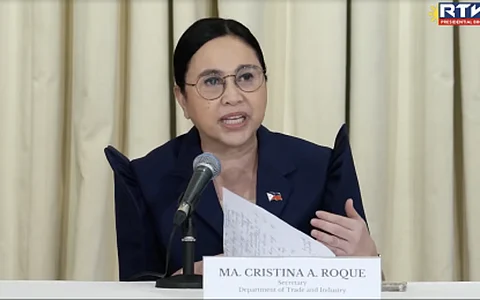
- NEWS
- the EDIT
- COMMENTARY
- BUSINESS
- LIFE
- SHOW
- ACTION
- GLOBAL GOALS
- SNAPS
- DYARYO TIRADA
- MORE

The country’s economic team is set to meet with its ASEAN counterparts on Thursday to discuss the global tariffs imposed by the United States, Trade Secretary Cristina Aldeguer-Roque said on Wednesday.
Roque said the meeting will aim to align the ASEAN members’ response to the US tariffs.
“We have a meeting on Thursday with the different ASEAN ministers, and let’s see what we can agree on and how we can work together as ASEAN,” she said.
“We need to listen to what our ASEAN partners have to say, and then the President and I will decide on our direction. For now, it’s good to listen and determine how we can make the best of this meeting,” she added.
Earlier, Roque and Special Assistant to the President for Investment and Economic Affairs Frederick Go confirmed that the country’s economic team had already met to discuss the Philippines’ response to the 17-percent tariff imposed by President Donald Trump on products the Philippines exports to the US.
For Roque, the imposed tariff may benefit Philippine exports that compete with those of other countries.
“If the tariff is 17 percent, we definitely have an edge. For example, our coconut products. Our main competitor in coconuts is Thailand, but Thailand’s tariff is 34 percent, so that gives us a strong edge. We need to aggressively push these industries now,” she said.
Roque pointed out the Philippines was meted out the second lowest tariff in Southeast Asia.
“When you compare it with other Southeast Asian countries, we are the second lowest. Vietnam’s is at 46 percent, Cambodia’s is 49 percent, China’s is 34 percent, and many others are much higher than ours. But we have a 17-percent tariff, so we must use this low tariff to promote Philippine products and investments both globally and locally,” she said.
While the world grapples with Trump’s tariffs, Roque emphasized that the Philippines is focused on exploring new opportunities rather than dwelling on the challenges.
“Lowering the tariff would always be ideal, but for me we should focus on the opportunities rather than what’s not working out,” she said.
Roque said the Philippines is exploring trade opportunities not just with the US but with other countries.
“Yes, we’re still optimistic. Another thing we’re looking into is pushing for free trade agreements, not just with the US, but with many other countries. Free trade brings many benefits,” she said.
The Department of Trade and Industry (DTI) is focusing on engaging with regions where the Philippines has strong connections and similar markets, such as the Middle East, South America and Asia.
Meanwhile, former presidential adviser for entrepreneurship Joey Concepcion remained optimistic about business with the US.
“Let’s see what happens. I think the Philippines has been a very close partner of America. As we get more clarity on what is happening in the US, I think we’ll be okay. I don’t think there will be a significant impact on the Philippines,” he told reporters.
He noted that most Philippine products in the US are not found in major supermarkets but are popular in Oriental stores.
“Most Filipino products exported to the US are niche items — instant noodles in various flavors, ketchup, and other local products. They still penetrate the US market, particularly the Filipino stores. But these are not mainstream products in the US, they’re more common in Oriental stores. So, I don’t think the impact will be huge,” Concepcion said.
He said these specific export products are too small for the US to impose significant tariffs on.
“I’m confident we will continue exporting. We still export some food products to the US,” he said.
Concepcion noted the effects of the US tariff on China, which could impact the global supply chain, and which is difficult to predict at this stage.
“It depends on which raw materials are affected. It’s hard to say right now. There will be disruptions, but I think we’ll be okay,” he said. Richbon Quevedo
